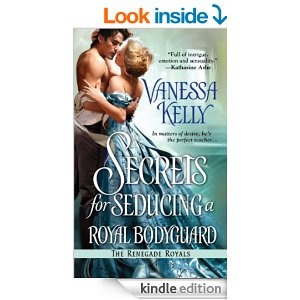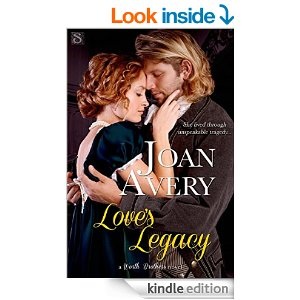|
The title of this post is in reference to the last one, and the fact that a lot of romance novels get classified as "Regency" because they don't fit into any of the other accepted categories (Scottish, Western, Medieval, etc.). The last book I posted about wasn't 'Regency' at all, but was classified as such because "late 19th-century Caribbean" isn't really an accepted sub-category of historical romance (although it does sound like a style of art, doesn't it?).
A true Regency takes place during... well, during the Regency, 1811-1820. This was the period when the British Prince Regent was running the show, even though his father King George III was still technically on the throne. A REAL Regency romance will incorporate the Jane Austen elements that we associate with that time period, rather than be just a romance set during those years. So, full disclosure: This isn't my favorite category of romance. I don't dislike it, but Jane Austen has never really done it for me. However, I was recently blown away by Vanessa Kelly's Renegade Royal series. Her attention to detail in terms of settings, phrases, characters, and terminology was brilliant. So many times I said "Wow!" aloud, impressed by her ability to seamlessly tie in period language and expression. And what could be more "Regency" than a book (book #1) that has the Prince Regent as a character? I won't give anything else away, but if you like real Regency romance, do yourself a favor and grab the first book in this series. Another cool thing about Ms.Kelly is that she doesn't switch POVs within a scene. That seems to be the norm these days, but not something that I personally do in my writing. I like reading a scene from one character's point-of-view, and I appreciate the skill that it takes to show the other characters' thoughts without hearing them. It's why I choose to write that way, and why I really enjoyed Ms. Kelly's writing. So if you're here, reading this because you like my stuff, might I recommend Vanessa Kelly? Particularly if you enjoy Regency redemption stories. Here's the first book in her Renegade Royals series. Go check it out!
1 Comment
Since I've started proposing my future work to specific publishers, I've been paying a lot more attention to who published whatever I'm reading. Do you bother doing that? I certainly didn't care who published what; I just wanted a good book. But now I'm noticing details like that, and I'm finding it helpful to get an idea of what certain publishers want.
I found Joan Avery's LOVE'S LEGACY through Entangled's Scandalous line. I'm not saying that it's the absolute best romance I've ever read, but I was impressed. I picked it up because of the date (1875, which is an unusual year in non-cowboy settings), the setting (a spice plantation in Grenada!) and the basic plot (she's been hired as a governess for his daughter, which is the plot of my unfinished New South Wales book). The book kept my interest because I have a soft spot for scarred, reclusive, dark heroes, especially if they're actually blondes (check out that cover art!). But what impressed me was that I cried three times during the book.When was the last time that happened? I don't read romance to cry! I want light and fluffy and sweet and Happily Ever After! LOVE'S LEGACY involves some pretty intense mother-child scenes, especially giving-birth scenes. Those were the ones that made me tear up. OK, I'm not actually recommending a book based on the birthing scenes, I'm just saying that Avery does a good job of capturing the emotions of that moment. If you read it, let me know what you think. Did you cry? Did you like the hero? I got an interesting edit on A Cheyenne Celebration that I wanted to share: When you're "hanging on tenderhooks", the word is actually "tenterhooks". I had no idea (but now understand why my spell check catches it)! So of course I looked it up...
Historically, when making wool cloth, the material ended up... well, sheepy (pretty sure that's a word). With the oils and dirt that the original fleece had on it. So you had to wash it, and then dry it, all without letting it shrink (because, you know, wool shrinks in the wash). So after washing, the wool was stretched on a wooden frame (called the tenter-- from the Latin "to stretch") with nails/hooks driven all around the edges. It was literally pinned to the frame with these "tenter hooks" and left to dry in the sun. So now, having seen quite a few of these devices, I can say that they DON'T look pleasant, and definitely not something I'd like to "hang on". Now that I know the origin of the phrase, I know I'll be able to use it more powerfully. Hopefully you will too! Have you ever discovered that you'd been using a word incorrectly? What was it? ...No Matter When They Are.
It's a twist on the Dr. Seuss line (from Horton Hears a Who) A person's a person, no matter how small! Dr. Seuss was trying to tell us that everyone deserves a chance to be heard, and chance to have the rights that his brothers have... because we're all people. Similarly, "People are people no matter where they are" reminds us that all over the world, right now, there are human beings just like us going through the same struggles and joys and mundane activities... and we need to remember that. We need to remember that the old man lying in his hospital bed could be us one day, or the mother of four struggling to feed her children in another country could have been us, but for an accident of birth. Remembering this will help us connect with our fellow human beings, and realize that our shared experience--the experience of being alive on this planet--is what binds us. People are People, No Matter When They Are. Likewise, if we remember that the old man and the mother of four who lived six hundred years ago were human beings as well, we will understand that we share the human experience with them as well. And that is--in my opinion--the heart of social history. We might not know that old man's importance, or that mother's name, but we know they existed. Of course, not knowing their names or deeds makes it difficult to study and understand those two humans specifically... so we study the world they lived in. What did they eat? How did they survive? What were the buildings/skills/religious beliefs/habits of the time? We might not know anything about that specific mother, but we can extrapolate her story based on our knowledge of her world. Historical fiction allows us to create that story. And, I might be biased here, but I'm pretty sure that historical romance is the best kind of historical fiction. ;) Here we get to create a world, a life, a story, and know that it will end happily. The real world--especially historically--doesn't always have its Happily Ever Afters, but in our stories, we know that the characters will live long, healthy, and happy lives together. And the heart of writing good historical fiction is remembering that--yep, you guessed it--People are People, No Matter When They Are. That character might have a different life experience than I have had, and different beliefs, different supports, different goals. But I can bring her to life, I can make her real, by knowing as much as possible about her world. She's a person, and I share that with her. I can extrapolate the rest. :) Happy reading! |
Historical Romance is
|
|
Privacy Policy - Website contains affiliate links
Caroline@CarolineLeeRomance.com
|

#HotHilariousHistorical (tm) #HistoryWithHeart (tm) |


 RSS Feed
RSS Feed




